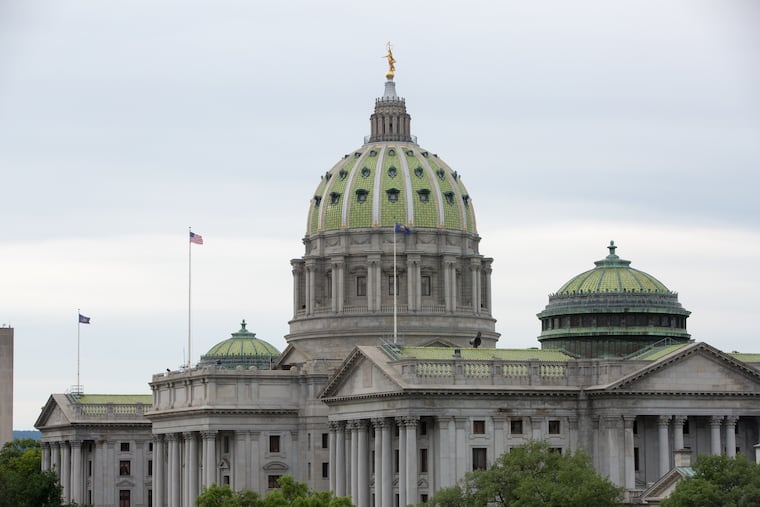Pa. legislature pledges transparency as it prepares to vote remotely on coronavirus relief
Members of the public will be able to watch what happens on a livestream, a measure both the House and Senate are taking to ensure there’s transparency during the coronavirus outbreak.

This story was produced as part of a joint effort among Spotlight PA, LNP Media Group, PennLive, PA Post, and WITF to cover how Pennsylvania state government is responding to the coronavirus. Sign up for Spotlight PA’s newsletter.
HARRISBURG — When the Pennsylvania House meets this week, its 203 members won’t pack into the ornate Capitol chamber where they usually gather. Instead, most lawmakers will tune in remotely to consider a bill that moves the state’s primary election to June 2.
Members of the public will be able to watch what happens by livestream, a measure both the House and Senate are taking to ensure there’s transparency during the coronavirus outbreak.
Committee meetings — which usually involve cramming two dozen lawmakers plus members of the public into a small room — will also be streamed live.
“One commitment that we do have is to be as transparent as absolutely possible,” Senate Majority Leader Jake Corman (R., Centre) said last week.
Pennsylvania law says state government entities may only take action during an open and public meeting, with some modifications available during an emergency, according to Erik Arneson, executive director of the state Office of Open Records.
But keeping a meeting open and accessible to the public contradicts federal COVID-19 guidelines. The Centers for Disease Control and Prevention recommends canceling all gatherings of more than 10 people and keeping at least six feet away from another person.
When public meetings are done remotely, Arneson said lawmakers must be able “to participate in some way.” While most members of the House do not need to attend proceedings in Harrisburg, only members present on the floor may speak about a bill, said Mike Straub, spokesperson for House Majority Leader Bryan Cutler (R., Lancaster).
The legislature is better prepared than many state agencies to maintain public access, Arneson said, as it has existing technology to support livestreaming. Smaller agencies may lack critical equipment to communicate with the public.
“The thing we keep telling agencies … is, if you have to take action at a meeting where [the public] can’t participate, just be sure to sort of be extra transparent,” Arneson added. “Talk about what you did, give the public the opportunity to comment on it.”
Under new rules passed in response to the coronavirus outbreak, rank-and-file members in the House will be able to text or email their votes to each caucus’ whip from home. However, the rules also require some party leaders to be present on the floor in Harrisburg.
In the Senate, which may be called on to vote this week, new rules state leadership doesn’t need to preside over the chamber in person, meaning virtually all of its work could be done online.
Still, a few members will be present in the chamber, according to Brittany Crampsie, spokesperson for Senate Democrats, while the rest will participate and vote via a video conference.
Kate Flessner, a spokesperson for President Pro Tempore Joe Scarnati (R., Jefferson), did not respond to questions about Senate operations but said proceedings will be streamed live.
“Now more than ever, every member of our community is looking for some sort of guidance, information, assistance,” State Sen. Scott Martin (R., Lancaster) said. “You’ve got to be accessible for it.”
Despite the Senate’s remote-voting rules, Martin said he is prepared to go to the Capitol this week unless Gov. Tom Wolf extends the stay-at-home order to Lancaster County. If that happens, Martin said, he’s ready to log in to the Senate’s video conference to participate in the floor discussion.
Leadership in both the House and Senate said lawmakers will only vote on coronavirus-related legislation for the near future. That includes the bill to move the state’s primary from April 28 to June 2.
On Monday, at least a dozen members of the House State Government Committee met in Harrisburg to advance the legislation. Some lawmakers sat side by side — approximately a foot apart — inside a Capitol meeting room.
“It’s kind of important for elected leaders to be on the forefront and show up to work,” said State Rep. Seth Grove (R., York), a member of the committee, who attended Monday’s meeting. “We ask that of our health-care professionals, first responders.... I just think it’s my duty as an elected leader to physically show up for work.”
On Twitter, State Rep. Kevin Boyle, a Philadelphia Democrat who co-chairs the committee, said members of his caucus “all took proper social distancing measures.”
100% ESSENTIAL: Spotlight PA provides its journalism at no cost to newsrooms across the state as a public good to keep our communities informed and thriving. If you value this service, please give a gift today at spotlightpa.org/donate.